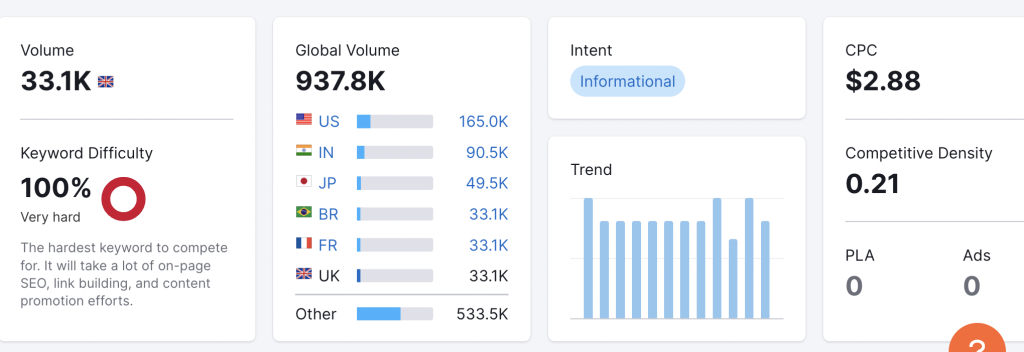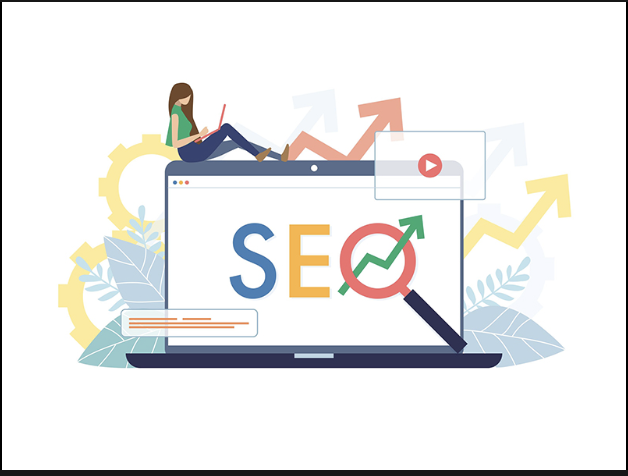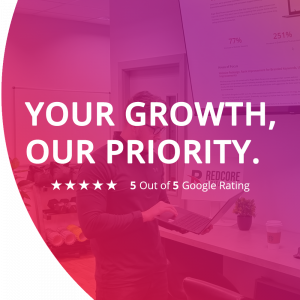What Is SEO?
SEO stands for Search Engine Optimisation.
It’s a set of practices used to improve a website’s visibility and ranking in search engine results.
By optimising various aspects of a website, such as content, keywords, and backlinks, SEO aims to attract more organic (non-paid) traffic from search engines like Google.
Incorporating keywords and phrases into content allows the website crawler to determine the relevance of the information.
If it believes the information to be relevant to the user’s search it will increase the possibility of ranking higher on the SERP.
Why Is SEO Important?
SEO is essential because it allows businesses to become visible to potential users via the SERP (search engine results page).
As well as increasing your business visibility, SEO also allows you to show authority, gain the trust of your audience and improve credibility as a business.
There are a number of benefits to SEO and It’s important to understand them.
SEO also allows you to optimise for usability by making relevant changes to your website such as
- Page speed
- Simple layout
- Easy navigation
- Image file sizes
By making positive changes to these crucial elements of your website you are setting potential customers up for a better user experience.
Optimising user experience increases the possibility of higher user engagement, longer site duration, and increased chances of conversions.
Finally, SEO allows your business to create a competitive advantage over other competing businesses.
Allowing you to compete effectively with your competitors and stand out in search engine results.
By implementing effective SEO strategies, you can outrank competitors, attract more traffic, and gain a competitive edge in your industry.
What Are The 4 Types Of SEO?
1. On-Page SEO
It involves optimising various elements of a webpage, including the content,
- HTML source code
- Meta tags
- Headings
- URL structure
- Internal linking
- Image optimisation
Including keywords and phrases can assist in increasing your SERP rankings and putting your business on the map!
Implementing directly on a website’s individual pages also improves its visibility and ranking in search engine results pages (SERPs).
2. Off-Page SEO
Off-page optimisation refers to optimisation that occurs off-site.
The primary goal is to improve its search engine ranking and online reputation.
Off-page SEO focuses on factors that are external to the website itself.
The most significant aspect of off-page SEO is building high-quality backlinks from reputable and relevant websites.
Backlinks serve as “votes of confidence” from other sites, indicating to search engines that the website being linked to is authoritative and trustworthy
Some other techniques used in off-page SEO are,
- social media marketing
- online reputation management
- guest blogging
These activities help to increase a website’s visibility, credibility, and popularity on the web.
3. Local SEO
Local SEO refers to the practice of optimising a website or online presence to improve visibility and rankings in local search engine results.
It is specifically targeted at businesses that serve a local or regional customer base.
Local SEO aims to increase a business’s online visibility for location-based searches.
Whether users are looking for products, services, or information within a specific geographical area.
Local SEO strategies typically involve optimising the website’s content and meta tags with location-specific keywords.
Ensuring consistent and accurate business information (name, address, phone number, or NAP) Across various online directories and platforms.
The goal of local SEO is to help businesses appear prominently in local search results, particularly the “local pack” or “map pack”
It’s key to ensure you appear on location-based search features like Google Maps.
By optimising for local search, businesses can attract more relevant local customers, and increase foot traffic to their physical locations.
4. Technical SEO
Technical SEO refers to the optimisation of a website’s technical aspects to improve its search engine visibility and performance.
It involves making adjustments and optimisations to the website’s backend and server settings, including
- structure
- coding
- Crawling
- indexing
- rendering
Technical SEO focuses on ensuring that search engines can effectively access, crawl, and understand the content on a website.
By addressing technical SEO aspects, website owners can improve the overall crawl ability, indexability, and user experience of their sites.
Leading to better search engine visibility, higher rankings, and increased organic traffic.

How To Learn SEO
SEO is a type of digital marketing that sometimes gets overlooked, but for those of us who are interested, how do you start learning/working in SEO?
There are a number of ways in which you can begin learning SEO.
Online courses are one of the leading ways to begin learning SEO.
Gaining real-time experience in SEO is the difficult part, of course, you need to understand the theory well enough to feel confident enough to put it into practice.
The most effective way to gain real experience is through a digital marketing apprenticeship.
Digital marketing apprenticeships allow you to gain real-life experience in the field of SEO.
A Digital Marketing apprenticeship also allows you to gain exposure to industry tools, you’ll have the opportunity to work with various industry tools and technologies that are integral to SEO.
This exposure allows you to become familiar with tools for keyword research, website auditing, link building, and analysis.
Enhancing your technical skills and understanding of SEO platforms.
Apprenticeships typically pair you with experienced professionals who can mentor and guide you throughout the process.
Their expertise and feedback can accelerate your learning curve and provide insights into industry best practices and strategies.
Although some universities do offer specialities in Digital marketing and SEO, it’s integral to gain hands-on experience to be successful in the SEO industry.
What are the 3 Cs of SEO?
1. Content
As the digital marketing industry grows there is one thing for sure, content is king!
Content is crucial in SEO as it plays a significant role in attracting and engaging both search engines and website visitors.
High-quality, relevant, and well-optimised content helps search engines understand the purpose and relevance of a website, leading to improved rankings.
Valuable content encourages
- user interaction,
- time spent on a website
- sharing and linking
All of which contribute to higher visibility and authority in search results.
Content serves as a platform to establish your business as an authority, demonstrate knowledge, and express your brand voice and values.
It allows you to showcase your expertise, build trust with your audience, and differentiate yourself from competitors.
By creating compelling and relevant content, you can position your business as a go-to resource and strengthen your overall online presence.
2. Code
Refers to the technical aspects of a website’s underlying code and structure. Optimising the code ensures that search engines can easily crawl and understand the content on a website.
Clean and well-structured code improves website performance, loading speed and user experience.
It also enables search engines to index the site efficiently and interpret the content accurately.
Ensuring to take care of Issues such as
- HTML markup
- mobile responsiveness,
- structured data implementation,
It means websites can enhance their visibility, and search engine rankings and create a positive business representation.
3. Credibility
It’s crucial that your website content is credible.
In order to ensure your website content creates authority, and expertise as well as enhances your business’s reputation, it’s important to ensure that your content is credible.
How do you ensure your content is credible?
- Use visuals where possible
- Be specific with the details
- Check for spelling & grammar errors
- Stay on topic
- Include other sources used (website links, infographics)
- Include research & statistics
Credibility is an essential component of creating a positive user experience and fostering a strong relationship with website visitors.
It encompasses building trust, establishing authority, and providing reliable and valuable information.
By ensuring credibility in your website and content, you enhance user satisfaction and encourage repeat visits.
Increase the likelihood of positive interactions and conversions.
What Are SEO Services?
SEO services are professional services provided by agencies or specialists to help businesses improve their search engine visibility and organic rankings.
These services typically involve a range of strategies and tactics, including keyword research, on-page optimisation, off-page link building, content creation, technical optimisation, and performance tracking.
The goal is to increase
- Website Traffic
- Attract targeted visitors
- Improve online visibility
Ultimately leading to higher search engine rankings and business growth.

Is SEO Worth The Investment?
As we’ve discussed throughout this blog, SEO has a multitude of benefits including
- Organic Search Traffic to Your Website
- Generates Leads
- Increases Brand Awareness
- Builds positive client relationships
- Helps gain an edge over competitors
The main reason businesses invest in SEO services is to increase business visibility.
Increasing the visibility of your business allows for your website and business to reach more potential purchasers, along with other major benefits if you dedicate time and money to SEO services.
Summary
In summary, by investing time & due diligence into finding an SEO Agency that aligns with your business values and culture, SEO can become an indispensable part of your operations.
Despite some perceiving SEO as costly and time-intensive, the advantages of a well-executed, long-term SEO strategy will greatly benefit both your business and your clients.
SEO offers numerous benefits for businesses that make it a worthwhile investment.
Firstly, it improves online visibility and search engine rankings, driving targeted organic traffic to your website.
This increased visibility leads to higher brand awareness and credibility.
SEO also enhances user experience by optimising website structure, content, and loading speed, resulting in improved engagement and conversions.
Furthermore, SEO provides long-term results, allowing businesses to establish a sustainable online presence.
Investing in SEO helps businesses stay competitive in the digital landscape, gain an edge over competitors, and achieve sustainable growth and success.
If you wish to learn more about our available SEO services, click here








